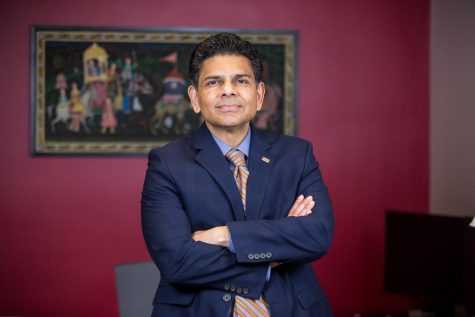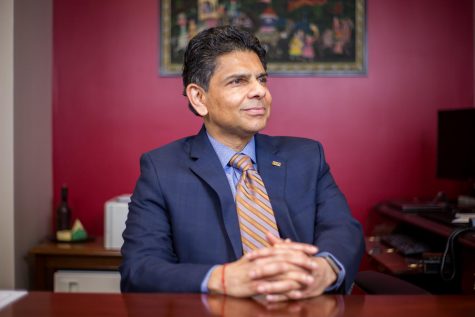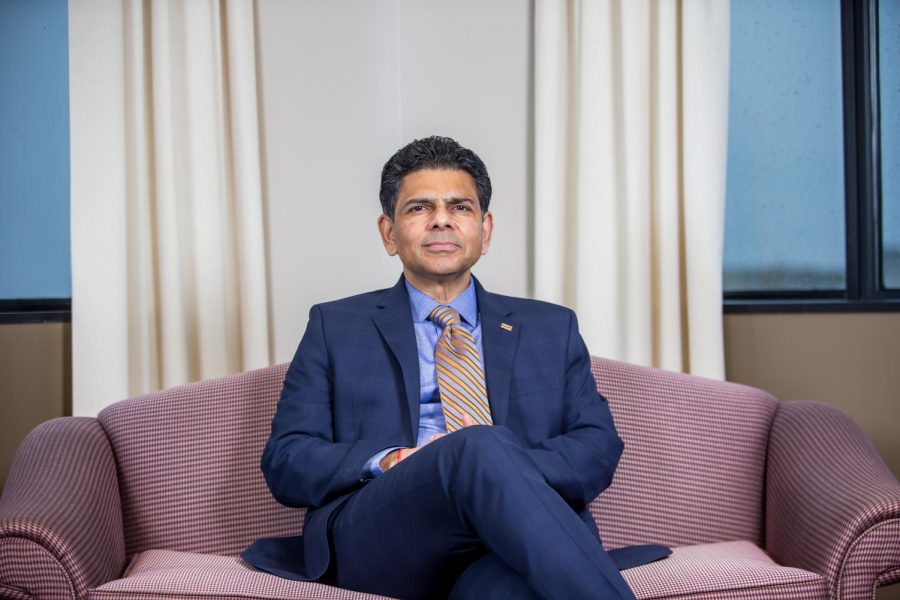President Ashish Vaidya’s departure from Northern Kentucky University was announced at a special Board of Regents meeting Thursday afternoon.
Dr. Ashish Vaidya: NKU installs sixth president
March 27, 2019
Growing up, President Ashish Vaidya’s father was a successful engineer for the Indian government, and back in those days it was assumed that to be a success you were either an engineer or a medical doctor.
What was Vaidya’s childhood dream? Not medicine or engineering, his sights were set on the seat of Finance Minister of India—a position akin to the U.S. Secretary of Treasury.
“Thankfully, my parents were actually very progressive and accommodating. They were like, ‘What is it that you want to study? What is it that you want to you want to do?’” Vaidya said.
The Indian government moved Vaidya’s father and his family around the country. India, not unlike America, has cultures within its greater Indian culture. India has 29 different states and each one is unique, just like the 50 diverse states in the U.S.

“That really speaks to the quality of Dr. Vaidya that the committee felt that strong about him.”—Brent Cooper, president & CEO of NKY Chamber of Commerce
“My wife jokes with me that I have no roots because I grew up in different parts of India,” Vaidya said. “My father was in government services, so I was in the north, the south, the east and west, and everywhere—if you know a little bit about India you would know that it’s very different.”
Vaidya’s multiculturalism didn’t stop there, though. According to him, diversity was something deeply ingrained in his childhood, something that has guided him throughout his time in academia.
“I think without knowing it, in many ways, I was absorbing the notion of difference and multiculturalism. But I think I was also appreciating it, because it was something that I both enjoyed, and in light, that you learn something when you interact with people that are different from you,” Vaidya said.
As a child, Vaidya’s travels turned the novelty of foreignness into an appreciation and celebration of it. He traveled from India after getting his Master’s at St. Xavier University in Mumbai and traveled to California to continue his education at University of California, Davis.
Vaidya stuck with academics and public higher education after getting his doctorate, as he believes education should be accessible and that opportunities for the underserved should let them climb the social and economic hierarchy of America to achieve their dreams.
“I think the more that I’ve been in the academy, and this started of course in California, was the notion that while there’s an appreciation for difference, not all the different groups that we encounter have the same opportunities as everybody else,” Vaidya said.
He used California State University Channel Islands, where Vaidya served as dean of faculty, as an example of how a public college should function. It was placed in between Los Angeles and Santa Barbara, in Ventura County, to serve a population that had no higher education options near them. This is a theme that has tied together the universities he has served; colleges in areas that don’t have much representation.
After Cal State, he worked at St. Cloud State University as provost and vice president of academic affairs. He eventually transitioned into an interim president role after the untimely death of the standing president, Earl H. Potter III. Just north of Minneapolis, MN, the city of St. Cloud serves a population of around 68,000 citizens; Northern Kentucky contains around 130,000 people, but is still in the same vein of small towns just outside of metropolitan areas.
St. Cloud State University has a rich history of serving a diverse student body, something Vaidya would inherit when he became interim president. He denies credit for making it diverse, as it had already been that way according to him. It took decades of intentional and inclusive leadership decisions to get St. Cloud State the reputation of being an internationalized institution.
“From the very beginning, it became this notion that we would seek out international students and bring them here and make them feel welcome here, so it sets a pipeline,” Vaidya said. “I inherited something that was pretty remarkable.”
During his tenure at St. Cloud State, Vaidya encountered a growing population of Somali refugees in need of public higher education. To him, there was nothing more important than these students feeling welcomed as first-generation students.
“Not only were they of African descent, but they also happen to be Muslim. The environment changed dramatically over the last few years, and many of the students felt somewhat concerned about their safety, their feeling of belonging with all the national rhetoric that we’re hearing,” Vaidya said.
Student inclusiveness has become something close to Vaidya’s heart, but he doesn’t take credit for St. Cloud State’s success. The whole team took precautions to make sure the incoming Somali students felt comfortable in the foreign space of a university and Vaidya’s presence may have been a big part of that.
“It was quite a revelation for me too—they clearly identified with me in a different way, because obviously, I was not white. So they were like, ‘Okay, what is this president saying about the environment? What is he saying about whether they’re welcome or not?’” Vaidya said.
This is something that Vaidya sees NKU doing, but there is always room for improvement. To him, a universities’ purpose is to serve the population of the region. Who knows where the next majority will be?
“We have, I think, ample opportunity to attract more diverse learners to NKU both from around the region, but also around the country, around the world,” Vaidya said.
Vaidya loved St. Cloud State, but he wanted to move into a more permanent presidential role and NKU provided the perfect opportunity for it.

“We have, I think, ample opportunity to attract more diverse learners to NKU both from around the region, but also around the country, around the world.”—Dr. Ashish Vaidya, president of NKU
“I remember it being a very long and exhaustive process,” said Brent Cooper, president and CEO of NKY Chamber of Commerce and member of NKU’s presidential search committee. “When I first got on the committee I was a little apprehensive because it was such a broad committee with faculty, staff and community members. It was a pretty big group and it’s hard to get a consensus with a group of that size.”
After receiving 30 applicants for the job that former president, Geoffrey Mearns, left in the hands of interim president Gerard St. Amand, the presidential search committee had a lot of people to interview and sift through. Then it was Vaidya’s turn to interview.
“It was unanimous,” said David Bauer, staff regent and president of Staff Congress. “I think it was just the way he interviewed and the things he brought to the table. He was the one person that we thought, what’s the word—not daring but bold—to take it to the next level.”
Bauer wanted someone who would stay and not use NKU as a stepping stone, a means to move up the administrative ladder. Cooper was also pleased when the committee selected Vaidya unanimously.
“That really speaks to the quality of Dr. Vaidya that the committee felt that strong about him,” Cooper said. “I’ve done a lot of things in my career and being on that committee is one that I am most proud of.”
Now that Vaidya is NKU’s president, what is he doing?
With the Success by Design strategic framework , NKU wants to deliver “innovative, student-centered education and engages in impactful scholarly and creative endeavors, all of which empower our graduates to have fulfilling careers and meaningful lives, while contributing to the economic, civic and social vitality of the region.”
Vaidya has echoed this during every speech he’s given on the topic of a strategic framework for NKU’s future success. With the last forum ending on March 20, 2019, more is to come on this topic. For now, Vaidya is content with his summer travel plans to Alaska, a new adventure for him and his wife, Nita.

